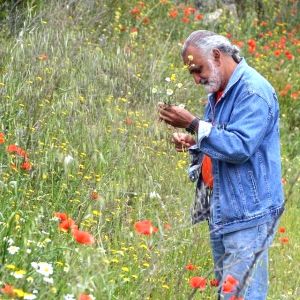JuanFran Lopez / Ragmans Lane Farm
27th July 2015
“Every single day humanity is related to soil. Our stomach does not exist without being tied to the soil – without soil there is no life, so why have one year that is for soil? Its madness.”
Jairo Restrepo is a leading champion of organic farming in Brazil, writes Juan Fran Lopez, and now his influence has spread across the world. His mission too has expanded to include campaigning for the rights of small scale farmers, and an even wider project of economic, technological and societal transformation to put people at the centre of political power.
Fran Lopez, and now his influence has spread across the world. His mission too has expanded to include campaigning for the rights of small scale farmers, and an even wider project of economic, technological and societal transformation to put people at the centre of political power.
A passionate educator and activist in sustainable agriculture and food sovereignty, Jairo Restrepo campaigns for a return of self determination, knowledge and autonomy to the farmer away from the power of agribusiness.
His background is in Latin America including Cuba, where his philosophy has been hugely influential in helping to build that country’s agroecological movement:
“When we started promoting the proposal of organic agriculture in Cuba, in 10 years we were linked with 87,500 promoters of organic agriculture“, he told me.
“From 1997 up to 2007 where a 10 year programme was concluded and an assessment was performed in Havana, we recognised that this movement grew due to the interest of many farmers, so we did have a huge impact.
“I participated in the founding of the movement in Cuba and made several consecutive volunteer trips from place to place throughout the country. One of my trips lasted 78 days, and we were in contact with 3,000 Cuban technicians – this practically became policy.
“Ideas are shared through farmer to farmer learning. But organic agriculture is not a small farmer unit. It is not even a broader political proposal; it is broader than that. Organic agriculture goes from being an instrument of technological transformation to an instrument for transforming society.”
Society’s enslavement by technology and capital must end
And that idea of organic farming as a means of societal change driven by clean, green, ‘open-source’ technologies is key to his mission, which is ultimately one of human liberation: “Society does not have to be detached from technology. Technology is an expression of society and this is what we want.
“We don’t want to change technology; we want to transform society, thereby changing the technological proposal. Today the opposite occurs, the dominant type of technology proposes a society subjugated to industry, and we want the opposite.
And here I use one sentence quite a lot … ‘my dream is to construct a being, an ideal state of a being, so that I shall not be the ideal being of the State.’ I want to fight for this ideal state of being so that I won’t be the ideal of the State; that is not to be slavish.”
Economic transformation too is another part of the equation, he explains: “Industrial agriculture is no longer able to respond to the crisis of societal change. On the contrary it is causing the crisis, because agriculture and the food system wants to enslave society, concentrating economic revenues.
“This hungry proposal of accumulating capital by all means causes a crisis, and farmers see that this is not a technological issue but an economic crisis that in turn is a political crisis. Capital is its own gravedigger in this respect.”
Unlikely beginnings – as a chemist working on agrochemicals
As an advocate for agroecology and regenerative farming, Jairo combines his passionate advocacy of the rights of farmers with his promotion of practical technologies and preparations to increase soil fertility and transform cropping, offering tools and inspiration for farmers, smallholders and activists.
So it’s surprising that he began he career as a chemist working on agrochemicals at the Federal University of Rio Grande de Sul in Brazil, where he was employed for many years. “I was researching how to eradicate the smell of rotten eggs from a phosphoric poison called Malatol used in corn and wheat storage”, he recalls.
“However, in 1979 I happened to hear a talk given by a professor working in the poison residues lab on the Ministry of Agriculture. His name was Sebastián Pinheiro and in 45 minutes he was able to describe how agricultural poisons were used not only in the environment, but also how the industry was born out of the second world war, and that it was now bribing the entire structure of the Brazilian Dictatorship.
“This was a turning point for me. I became very self critical and aligned myself with Pinheiro. Working with him, I trained in chemical residue analysis, and then I started speaking out to defend and protect life.”
The three big challenges facing the organic movement
So what obstacles are facing him in disseminating his message further? “In South America there are three obstacles”, says Jairo. “The first is the State. It has little societal commitment and no desire to change. Industry is where the power lies, and politicians are temporarily there as its representatives.
“The second obstacle is the monolithic approach of Universities. The term University is derived from ‘universities’, the universal set of knowledge possible to dream up, construct, and propose a thesis.
“Today Universities don’t propose theses, they propose ‘research’ but already know the results. This is adjusted research. Industry does not need universities for knowledge, as they conduct more research themselves, what they need is legitimacy. People have an idea that university is ‘free, public and serves the people’. That’s a lie, the university doesn’t represent the citizenry.
“What’s more, if universities were to close farmers wouldn’t even notice, the social impact of universities is negligible as compared to farmers. People think that Universities are prestigious; this is still the image that is maintained, like a veil. The truth is that the University is a brothel, where knowledge and technology are prostituted.”
The third obstacle, says Jairo, is rural outreach – the system for disseminating information to farmers, widely co-opted by commercial organisations to promote their private interests:
“It has been created on a lie. It assumes farmers as a technological consumer unit rather than as a cultural entity. The agricultural supply industry can sell products through operatives that need very little training – you don’t need to be an agronomist, to be a mugger you don’t need to go to college.
“Organic agriculture is about rural communication, where discussion and dialogue is held, where the farmer is recognized as having something to give, as they know the territory. The farmer provides the context and the background, and then others coming in can see the potential or possibilities. This is the basis for developing organic agriculture where both parties can grow together.”
The roots of life are in the soil
One way that Jairo seeks to influence the world is in his role as consultant to the UN. UNESCO and the International Labour Organisation – not that he is too impressed with the UN’s designation of 2015 as the ‘Year of the Soil’:
“They have a year for everything. Saying it’s the year of the Soil is like saying its International Life Year! Every single day humanity is related to soil. Our stomach does not exist without being tied to the soil – without soil there is no life, so why have one year that is for soil? Its madness.”
But still, there is the potential for good things to result – especially with the COP21 climate conference taking place in Paris this December: it’s essential to remove carbon from the atmosphere, where it causes global warming, to the soil, where it retains moisture and nutrients, and provides the basis for productive, resilient farming:
“It’s very simple. The more we can build life in the soil, the less carbon will be in the atmosphere. So for example the herbicide industry should pay for carbon emissions, not only for the embodied oil within the product itself, but for killing life.
“Fungicides greatly modify the climate, why? Because they are selective and modify the food networks connecting microbiology and decomposition. When decomposition of organic matter is paralysed and modified this releases more carbon. On the other hand the proposal of organic agriculture is to increase soil life and to trap carbon within productive systems.”
Hope springs eternal
And despite the many setbacks suffered by across Latin America with the advance of industrial farming across enormous areas of Brazil and Argentina, Jairo remains optimistic, buoyed by campaign successes and a growing spirit of rebellion against corrupt politicians and the dominance of agribusiness.
“Many things in Latin America happened due to the crisis or terror and rising social tension”, says Jairo. “So there is resistance and re-existence. When I speak of re-existence I speak of people who have always found a way without industrial agriculture. Some farmers have access to industrial technology, other have not.
“But the changes are huge. 75% of farmers in Latin America are now using organic fertilizer in one way or another and they produce 67% of food in Latin America, mostly in the small farmer sector.”
An agronomist with a rebellious character, Jairo has developed a passionate belief in people power, in local rural culture, food sovereignty, and a powerful desire to transmit the indigenous knowledge and experience gathered from over 20 years work across all continents. And he’s as clear as ever about the work he has to do:
“My mission now is to defend life. This is my purpose, my instinct, but also to protect the conditions that encourage perpetual and healthy life.”
